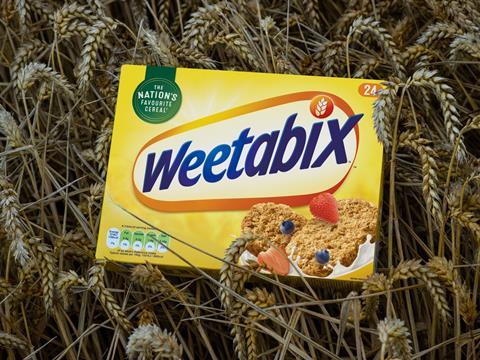
Weetabix Food Company reports that all the packaging across its portfolio is now 100% recyclable, two years ahead of its 2025 target.
All of Weetabix’s paper-based packaging components and On The Go drinks bottles, the latter of which is composed of 51% recycled plastic, can be widely recycled at home, according to the company. Meanwhile, its plastic wrap components can reportedly be recycled with soft plastics at most major supermarkets.
With 9.5 million UK households thought to purchase Weetabix products, Weetabix Food Company anticipates that its carbon footprint is set to decrease by 648.4T annually.
“The final piece of the sustainable packaging puzzle for us was bringing Alpen 1.1kg inner bags and Ready Brek sachets in line with the credentials of the rest of our materials,” explains Mark Tyrrell, packaging development manager at Weetabix Food Company. “We did extensive testing with our supplier to come up with recyclable film options that would run smoothly on our machines.
“These new recyclable films ensure there is no compromise on product freshness, meaning that our consumers can be confident of the same great Weetabix quality and taste whilst knowing they are using their purchasing power for the good of the planet.
“The next step for us will be to further reduce the carbon footprint of our packaging, as contributing factor to Weetabix’s commitment to producing the first zero carbon box of cereal, and the wider ambition of operating as a net zero business by 2050.”
Lorraine Rothwell, head of Weetabix Brand, adds: “With costs rising in almost every part of our daily lives, there has never been more demand for affordable meal solutions. You can buy a box of Weetabix for less than the price of a cup of high-street coffee, and feed a family of four breakfast for a week for £1.
“But Weetabix is committed to giving you more with every box – not just great nutrition at a great price, but investment in crucial charities like Magic Breakfast and FareShare, and robust sustainability credentials that make a real difference to both our local and global communities.
“Weetabix celebrated its 90th birthday last year – proof that our pledges and commitments have weight and longevity and need to deliver in more than just the short term. We want the changes we make today to still be improving the lives of people and the health of the planet 90 years from now.”
In 2021, the company announced its goal of redesigning 99% of its packaging to be widely recyclable by the summer of 2022.
Other sustainability-minded initiatives related to cereal include Nestlé’s recently unveiled refillable vending machine for its Milo and Koko Krunch brands, which is currently being piloted in Indonesia in the hopes of cutting down on disposable packaging.
Kellogg’s, Deldea Design, HP Indigo, and Precision Proco Group worked together last November to design and digitally print limited-edition packaging in celebration of the 100th anniversary of the Corn Flakes cereal brand.
If you liked this article, you might also enjoy:
McKinsey on whether or not on-pack sustainability claims affect consumer spending
A deep dive into the most important packaging sustainability trends and solutions














No comments yet